|
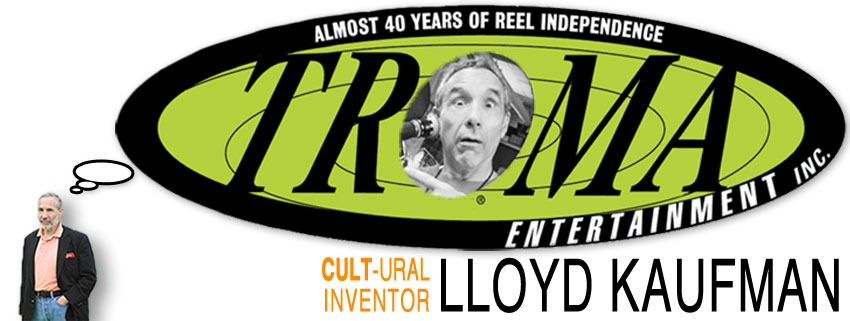
Cultmachine's John Huff and Andreas Kossak (1) synced up with the distributor of their movie Cyxork 7, the enigmatic cult-ural anarchist / prolific indie film warrior Lloyd Kaufman (2) and got a freeze-frame glimpse of his ever-evolving thoughts on filmmaking, culture, business, the future of cinema, net neutrality and the ontological implications of mooning aliens.
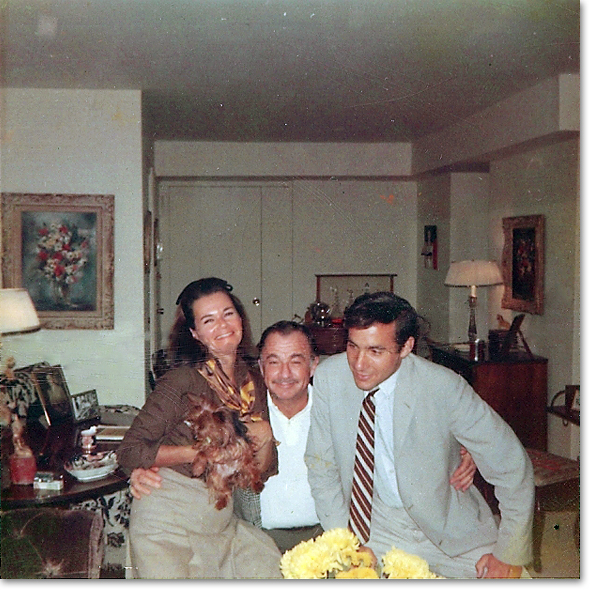 |
|
Finally! Celebrating high school graduation with Mom and Dad. Note the photo's enormous 'headroom' (aka 'Zen Space') foreshadowing Lloyd's unique film career.
|
John Huff: Of all the things said about your entry into indie filmmaking, what really grabbed you at the earliest age? Why not ballet, lyric poetry or the cello? You must have been hooked by some certain movies.
Lloyd Kaufman: I have to give credit to the Yale Student Housing for pairing me with a movie buff roommate my freshman year. It was when I saw Ernst Lubitsch's To Be Or Not To Be that I was hooked. It's an insane film, but also 100% controlled and this dichotomy was fascinating to me. It sucked me into the auteur theory. If it wasn't for that stupid theory I'd be Spielberg and rolling around in mounds of money and cocaine in Hollywood instead of in fake blood and rat shit in Tromaville.
JH: When did you pick up a movie camera first time?
LK: In my sophomore year I got a Bolex. It sounds like a sex toy or STD, but a Bolex is a 16 mm camera which you need to wind up and it only runs for around 40 seconds. You cannot sync sound on a Bolex, which forced me to tell the story solely through visuals. I then ended up making my first feature length film, The Girl Who Returned.
 |
|
No movie play. This is the real job. But why must Dad always wear his Director's Viewfinder?
|
JH: Why Yale? Why 'China Studies'?
LK: It was the 60s and I wanted to make the world a better place as a social worker or teacher. I basically wanted to turn my life into a Beatles song- teach people with hooks-for-hands how to finger paint, show orphans how to cry on command, teach bums underwater basketweaving. I didn't really enjoy campus life at Yale that much and I spent a lot of time in New York City instead hanging out at venues like Max's Kansas City with the likes of Warhol.
JH: Okay, your partner Michael Herz, seldom seen in public. How did you meet? How did you work together from the early days to now?
LK: Michael also attended Yale. I actually cast him in The Girl Who Returned, we fell in love and now we will live happily ever after in Tromaville.
JH: Okay, Yale, Class of '68. I've kidded you and asked if you knew George W. Bush and did you too join Skull and Bones?-- and you copped a "No" to both counts-- but you did do, what I consider the penultimate documentary statement on the great William Sloane Coffin, Splendor & Wisdom. What brought that about?
LK: By the way, we could never figure out during freshman year at Yale why G.W. Bush was always going around campus looking for weapons of mass destruction.
I said, No? Bush and I used to have slumber parties together. I would braid his hair, he'd paint my nails, we'd bake cookies in the shape of hearts--your typical boys' night.
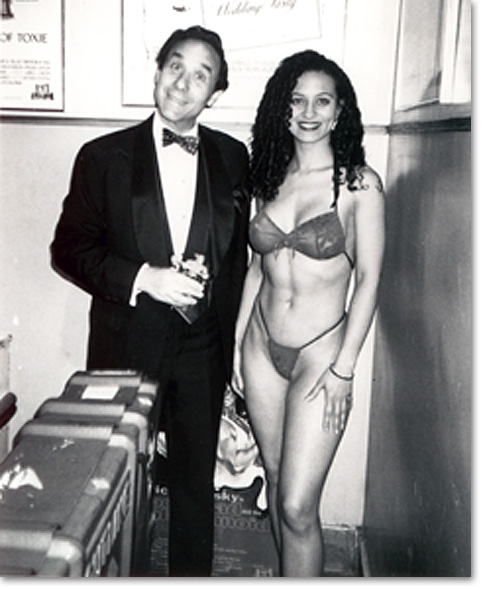 |
|
Lloyd celebrating Troma's early triumphs with his "life-partner," the reclusive and mysterious Michael Herz.
|
Splendor & Wisdom came about when the Yale Class of '68 invited Coffin to our 35th reunion where he gave what would be his final speech. He was a hero for civil rights, peace and activism. He was truly gifted and his story needed to be told. I guess Oliver Stone, who was also in my class refused to pay for this film so I was asked.
JH: From William Sloane Coffin to Poultrygeist, you will say you have a range?
LK: From civil rights to chicken fucking. That is quite a range. Don't forget my efforts in children's programming with Toxic Crusaders and Doggie Tails too.
JH: What do you think some people in Hollywood most mis-perceive about you?
LK: I don't think there is much of a misperception. I am honored to have been cited as an influence on many talented directors in Hollywood like Quentin Tarantino, Eli Roth and Takashi Miike. Stan Lee said, "Lloyd's body of work has now proven to be a seminal influence on film today. Just look at any film created by the likes of Quentin Tarantino, Takashi Miike, Peter Jackson, Eli Roth, Gasper Noé, and James Gunn, to name a few, and you are likely watching a film influenced by Class of Nuke 'Em High, Tromeo & Juliet, or Citizen Toxie.
Andreas Kossak: How is Troma adapting to the changing world of distribution where now downloads and social media marketing have replaced the old tried-and-true ways of promoting a selling a movie?
LK: The digital age has definitely democratized filmmaking and made it practically cost-free and social networking has made it so filmmakers can promote their project to a wide audience without having to take out ads in Variety. Thanks to the internet, it is easier than ever to get your film seen.
 |
The secret reason Troma can give away films for free: it has pinoneered the creation of revenues through Photosynthesis! (3)
|
This is one of the many reasons that I'm so passionate about preserving Net Neutrality. Currently, a young filmmaker can put their work online and attract millions of viewers based on the quality of the content. If Net Neutrality goes away, indie artists will find themselves struggling to be noticed on the expensive, elite information superhighway which will be dominated by mega-conglomerates.
Of course social media has also been key in keeping the Troma name out there-- it has been a great way to promote as well as communicate with fans. My Twitter, @lloydkaufman, is great entertainment and educational.
AK: Is there a way of dealing with the financial carnage that illegal piracy of movies is doing to the most vulnerable of the movie world, the indie filmmakers?
LK: I want people to share my movies. The most valuable thing a viewer can give me is her time (and then her soul). I know this will lead to revenue for Troma and me. In my recent book Sell Your Own Damn Movie! I include a controversial pro-piracy and file-sharing chapter. The internet can only help young artists and therefore the criminalization of sharing art must be stopped. Nina Paley(4), who is interviewed in Sell Your Own Damn Movie! was able to make a profit off of her film Sita Sings The Blues by putting it up online for free. Copyright law must be changed!
JH: You interfaced with some demonstrators in January after which you made a statement on Troma's YouTube. What happened? And what's your current thinking on this?
LK: Oh, yes, "Hey, 'little man.' You goin' to your jooooob?" The Occupy Wall Street crackhead seemed a little confused about his mission. Many think that the strength of Occupy Wall Street lies in the ambiguity of its mission. Why waste your time, assets, camping gear and risk good hygeine for an unknown cause? What could be a valuable tool has turned into a circus. Selling I Occupied Wall Street shirts, holding incoherent signs pertaining to inter-species fornication, sanitation strikes/public urination (it's not like the city and subways don't already reek of piss--maybe we should focus on the occupy the bathroom movement), and brutality are more likened to a Troma movie than a major political movement. Occupy Anywhere needed a focus and I tried to help in my You Tube video. Do what Martin Luther King did and he changed the world-- of course he got his brains blown out too.
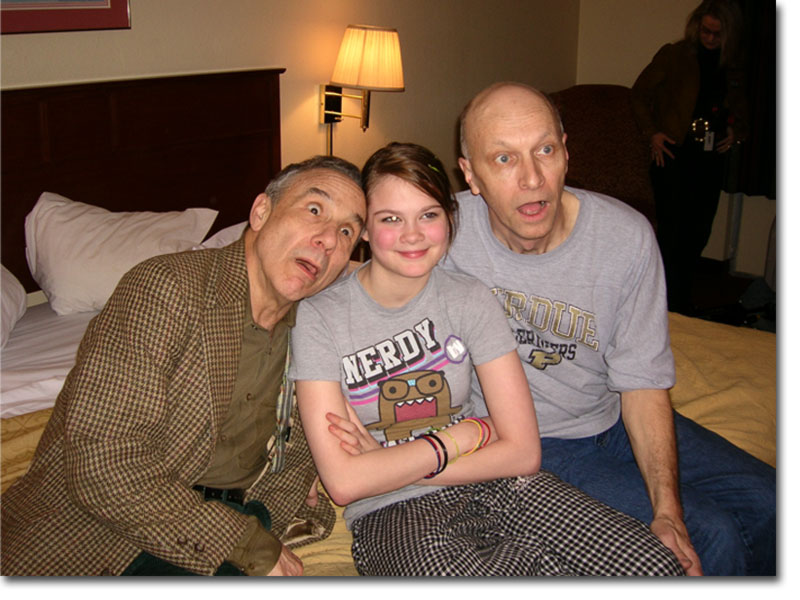 |
| MICRO-SIZE ME! Lloyd and indie filmmaker Randy DeFord contemplating what life will be like in the world of micro budget movies and crowd-source (micro) financing.(5) |
AK: With DVD sales being the most lucrative and only way for indie filmmakers to stay alive, since they don't have access to large theatrical runs like the studios, and those DVD sales collapsing (and inviting piracy) what does the future look like for indie filmmakers who don't want to financially self-destruct for taking the risk and making movies?
LK: Thanks to new technologies, as well as social media, filmmaking does not have to be a financial burden anymore. It just takes passion and drive. Micro-budget films are becoming festival darlings, leading to box office hits. You really don't need much money but the internet has introduced fundraising websites like Kickstarter and Indiegogo which follow the crowd sourcing finance model. These sites are a way to raise money for your film while still maintaining control of your project.
JH: We hear you're going to work with Randy DeFord and there is a documentary in the planning. You fearless man.
LK: Randy is great and a very talented filmmaker. He also sees me for more than just my good looks, and cast me in a serious role in his film Purge Clause starring Julie Powers. Working with him again would be a pleasure.
RANDY DEFORD: Hey Lloyd, what's your gut reaction to the acceptance of Father's Day?
LK: Father's Day is a great film... in true Troma fashion, it is extreme visionary and socio-politically important. Above all it is a mixture of genres and like Poultrygeist, in a fair world would gross 50,000,000 in it's first week-end in theatres.
RDF: Are there any movies recently from LaLa Land that you have found interesting at all?
LK: In terms of mainstream movies--Hugo was good. The Descendants was good. BTW, the comatose woman in The Descendants was a better silent performer than the Oscar winning Fartist guy. The Help was good. I like anything by Chaplin, Ford, Renoir, Lang, Wilder, Keaton, Hawkes, blah blah blah...
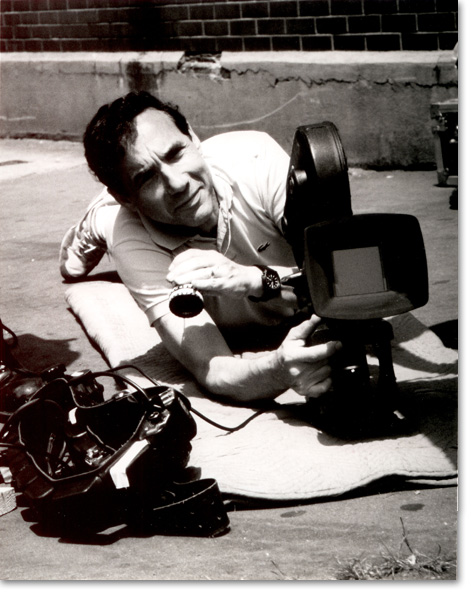 |
|
Sometimes down at High Hat level, but never out--and always back!
|
JH: When I saw an interview you did with Ernest R. Dickerson and you talked about still owning your first camera and your affection for the great cameras and great camera work, I was reminded how much you loved it all and I was reminded that in Cyxork 7 -which Bill Gibron in Popmatters says 'reestablished Lloyd Kaufman and Michael Hertz as the most important names in indie filmmaking today- ' we used an Arriflex BL-IV (a great workhorse that has made many a movie) with a Cooke zoom lens on a historic Ronford tripod. For us, this was a prop. Given to us practically for free by the rental house because no one was using them anymore. We shot Cyxork on the Sony F-900. So, Lloyd, as the filmmaking art becomes so accessible with digital tools, it would seem you and Make Your Own Damn Movie are coming into your day like never before. Is that smoke to you or do you concur?
LK: IT'S SMOKE! Rupert Murdoch and the Media Conglomerates still make the laws and own the media. I just want to blow my fucking brains out. However, before the digital revolution, film was the exclusive domain of the rich and powerful. Even my 1970's movies like Squeeze Play and Waitress cost $150,000 to make-- which is a lot of money, even today. To put in perspective, the budget for Troma's Waitress in today's dollar could have produced about 50 installments of Paranormal Activity.
AK: Someone once compared the indie filmmaker in the future as similar to a musician who produces music in her/his studio and then releases it to a subscription based fan-following as a way for survival. Is that something you see on the horizon, something you do, or is there something different? What will Troma be in 10 years from now.
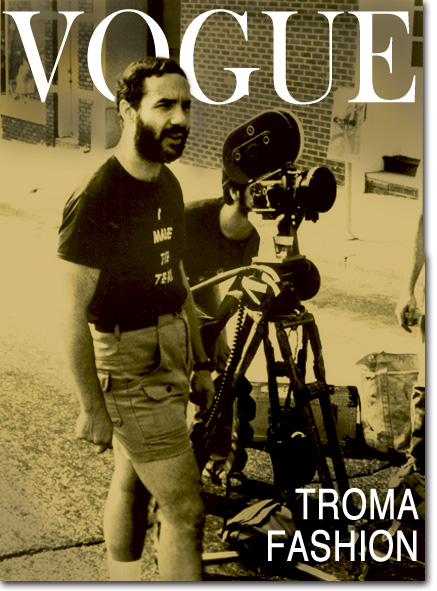 |
|
Lloyd made the cover of Vogue! The magazine celebrated his iconic sense of style with a special edition on 'Troma Fashion.'
|
LK: Troma owes everything to our fans. It is the loyal cult fan base that keeps Troma going. They may be smelly, drunk, rabid, acne-ridden, and still living in their mother's basement doing Demi Moore Whip-its, but they are devoted and we love them all. Troma is almost in its 40th year of independent filmmaking-- 10 years from now (if I'm not partying in hell)--- at the 50 year mark-- I'll still want to blow my fucking brains out.
JH: Of all the Founding Fathers, might there be (if a time-warp permitted) any secret Troma-heads?
LK: Most of the Founding Fathers probably would be Tromites. Jefferson was a horny and scandalous man and approved of file sharing, Taft was pretty fat (and fat + fart = funny), and Benjamin Franklin, aside from his ingenious inventions, was responsible for the gloryhole. What a Tromatic bunch!
JH: Okay, Lloyd, my question I've been asking victims interviewees: If extra-terrestrials incontrovertibly reveal their asses to us this year, like on your favorite news network, unavoidably true, like Michael Rennie in front of the White House, Lloyd, what genre sci-fi or horror film is going to be a template for our experience of that event? It's just genre Rorschach, come on, go with it.
LK: Yes! This question is indeed asshole time. Reveal their asses? Like mooning? Mooning does sound pretty spacey now that I think of it. So if aliens mooned us earthlings via Rock Center with Brian Williams I hope they are like the three-boobed-broad in Total Recall or the Martian call girl in Mars Attacks. Perhaps the aliens can answer the question 'If Ron Jeremy sucks his own dick, does that make him gay? Or, is he gay if he swallows it?'
JH: Okay, this wasn't bad was it? Not a trip to the dentist. What do you most appreciate about life and today?
LK: Of course, my three beautiful daughters and my wife, the lovely New York State Film Commissioner, my life partner, Michael Herz and Twizzlers.
____________
THE DON'T-BOTHER-READING-IT FINE PRINT:
(1) (2) For reasons of disclosure (1) are licensors and (2)'s company is the licensee of the million-dollar plus, award winning movie Cyxork 7.
(3) This is the Gamechanger: After some Angst-laden Q&As, the Licensees are fully satisfied that Licensor can and will live up to paragraph 7.3 of Licensor's standard distribution agreement "(...) and it is further understood and agreed that Licensee shall only release the Film if, in Licensee's judgement, such release is likely to generate net revenue to Licensor and Licensee." Even Licensee's investor Sammy "the Surgeon" Siciliano and his Southern European equity partners like that licensee has found an ingenious way of "going green."
(4) The "Paley" model of making money by not making money is now a central part of the Neo-Keynesian curriculum at Harvard and will soon be proposed by Fed. Chair "The Beard" Bernanke as a model for solving our nation's financial problems. Remember: you heard it first from Lloyd.
(5) Rumors have it, that there will be Micro Mortages for indie filmmakers, as well as micro-sized meals at McD. for all those cinematic creators thriving on micro incomes.
P.S.: John Huff believes Troma is worth about $250 Mio as the core value and business is not so much film production / distribution, but building its brand name.
|
|
|









